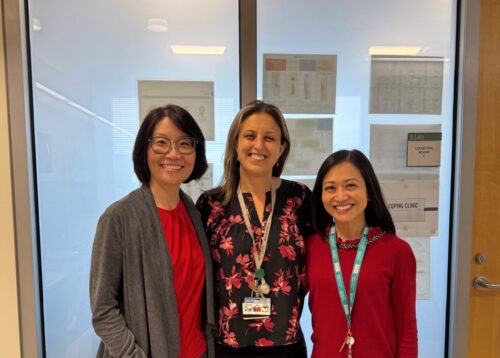The COVID-19 Pandemic Sparked a Shift in SOFAR's Addiction Care Model
October 25, 2021

Getty Images
At its origin a mother-newborn dyadic care model, the comprehensive addiction care model has added the urgent need to prevent older children from developing SUD.
“I feel like I’m losing all control,” said a mother in recovery from substance use disorder (SUD). Her child, who had returned from foster care, was struggling with mental and behavioral challenges at home and school.
“You’re the only family I have left,” said another mother in recovery from SUD. She had lost her own mother, her “rock,” to COVID-19.
“We don’t know what we would do without your support,” said grandparents who stepped into the role of primary caregivers for their grandchildren after their daughter’s relapse.
More heartbreaking statements like these are heard every day by Boston Medical Center’s SOFAR team as they carry out the mission behind the program’s acronym, “Supporting Our Families through Addiction and Recovery.” Their words reflect the turbulence of being in recovery from addiction and stress how the program can be a lifeline for its 249 families. That turbulence has now only been amplified amid the stress of the COVID-19 pandemic and the closure of services.
Supporting families through the ups and downs of addiction recovery
For expectant mothers with SUD, pregnancy is often a motivation for recovery. However, because the demands of new motherhood can put immense strain on a person’s ability to cope, by the second half of a baby’s first year of life, the mother’s risk of opioid overdose is even higher than before pregnancy.
A baby needs to visit the doctor often in the first year of life—the vaccination schedule alone calls for upward of eight visits—and that fact sparked an idea among specialists to use those appointments to address the mother’s needs as well. Using a dyadic mother-infant care model, SOFAR was established in 2017 as a medical home offering wraparound care for mothers in recovery and their children.
“Our line is, ‘The child will thrive if the parents are well.'”
Initially, SOFAR aimed to reduce relapse in mothers of newborns. But it became apparent that was only one small piece of what recovery support looks like for families.
“When we started SOFAR, we thought we were going to save everybody,” says Sara Stulac, MD, MPH, SOFAR’s co-director. “We’ve realized we’re actually going to accompany patients through the ups and downs of recovery. And that includes relapse.”
With a pivot toward welcoming any child—not just newborns—who has a parent with addiction or in recovery, SOFAR has found its niche. Caring for every patient family is an integrated multidisciplinary team consisting of primary care pediatricians, a social worker, patient navigator, infectious diseases nurse practitioner, and newly joined developmental and behavioral pediatrician.
“Our line is, ‘The child will thrive if the parents are well,’ says Eileen Costello, MD, chief of Ambulatory Pediatrics and co-director of the SOFAR clinic. “Even though we are pediatricians, a lot of our energy is spent on promoting the ongoing recovery of the parents. Making sure parents are connected to their own care is a really important part of our work.”
The pandemic caused ‘a whole lot of collateral damage for children’
The COVID-19 pandemic has been detrimental to those with SUD. Stay-at-home orders, job loss and economic instability, isolation, and stress have led to increases in overdoses and overdose deaths, disruptions in access to treatment, and an increase in new use.
“We know COVID in general has put stress on families and we know COVID in general has put stress on people with addiction,” Stulac says. “When we put those together, it’s a whole lot of collateral damage for children.”
“Addiction is very much a pediatric issue.” Click To Tweet
There have been indications that the pandemic has chipped away at the already fragile foundation of SOFAR’s families. On top of a rise in relapse and stress, there has been a greater need for food and housing. Addressing the latter has been next to impossible at times amid community organizations closing their offices.
“Closures have been a huge barrier since patients would normally obtain these services in person,” says Kristin Reed, SOFAR’s patient navigator. “We’re filling gaps by providing items like donated diapers and food.”
There have also been an uptick in protective concerns.
“We’ve been the only constant for a lot of our families this year,” says Jill Baker, LICSW, SOFAR’s clinical social worker. “So many services turned virtual and it just didn’t work for a lot of the parents who are in recovery. I think their recovery and mental health have suffered because of that.”
‘How do we prevent these kids from becoming adults with addiction?’
Prior to the pandemic, the SOFAR team had been seeing manifestations of how SUD impacts its older pediatric patients, raising concerns around early intervention to prevent SUD later in life. The pandemic has added a layer of urgency to the matter.
Between the clinic’s initial cohort of infant patients now reaching ages 4 and 5 and its expansion to include older children, SOFAR is particularly focused on answering the question: How do we prevent these kids from becoming adults with addiction?
Costello says that a child who grows up in a family with substance use disorder is 10 times more likely to develop SUD compared to a child who does not. She adds that one in five kids in BMC’s pediatric primary care clinic screened positive for a behavioral health condition, a key contributing factor to developing SUD.
Like many of her colleagues, Costello has plenty of anecdotes from parents with SUD who can identify a time in their childhood that led them to initiating substance use. For one patient, it was trying cocaine for the first time with her mother at age 11, she says. For another, substances were self-medication for ADHD. One shared, “I’ve been anxious my whole life. It’s what made me love heroin.”
There are already school-aged patients in the clinic with behavioral and mental health challenges that could precipitate a future substance use disorder. A common scenario is children being returned to their families after being in foster care.
“You’ve got a mom in early recovery with a newborn who may be a little fussier than standard [due to prenatal exposure to substances],” Stulac explains. “And now her 6-year-old is back in her care and has all these feelings to deal with, like confusion and trauma from the separation. They are likely going to a new school and having behavioral and academic struggles. Mom is overwhelmed and in need of mental health services, which are especially difficult to access during COVID.”
For these cases and many like them, the SOFAR team is working directly with schools and equipping parents with the tools to cope. Reed, along with developmental and behavioral pediatrician Mei Elansary, MD, obtain releases so the clinic can be in direct communication with the school. She also acts as a liaison to ensure everyone is on the same page about the child’s needs. This includes advocating for getting patients access to certain services offered by the school.
“A mom will call me and say, ‘This isn’t going right,'” Reed says. “Because we are in communication with the schools and tuned into a child’s situation in real-time, we’re better able to provide guidance to her and step in if needed.”
Of course, this is just a starting point for a larger effort. “What we’ve learned is ‘big’ kids have bigger problems,” Stulac says. “We’re figuring out how to design better, more robust programming for the school-aged kids and the young adolescents in terms of mental health challenges, school challenges, ADHD, and trauma of past separation from parents.”
Underscoring these strides is a call for a paradigm shift. “Addiction is very much a pediatric issue,” says Costello.
“We feel it is our responsibility to educate the pediatric workforce about getting in on the ground floor and helping kids develop distress tolerance and strategies for coping with anxiety, depression, ADHD, or trauma—all the things that make kids pick up and use. We should also be helping parents have conversations with their kids about SUD and the signs and symptoms, just as they would with any other disease that runs in the family. Addiction can no longer be the elephant in the room.”


